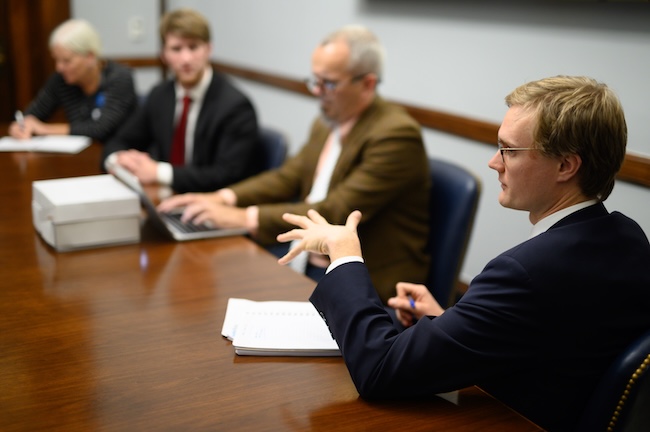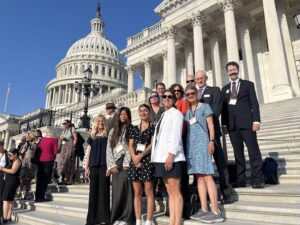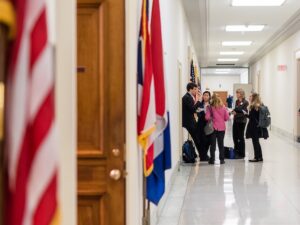CCL submits a formal comment on EPA’s proposed endangerment finding rollback
By Dana Nuccitelli, CCL Research Manager
On July 29, the EPA proposed to rescind its 2009 endangerment finding that forms the basis of all federal climate pollution regulations.
Without the endangerment finding, the EPA may not be allowed or able to regulate greenhouse gas pollution from sources like power plants or vehicle tailpipes, as they have done for years. News coverage has framed this as a “radical transformation” and a “bid to scrap almost all pollution regulations,” so it has appropriately alarmed many folks in the climate and environment space.
At CCL, we focus our efforts on working with Congress to implement durable climate policies, and so we don’t normally take actions on issues like this that relate to federal agencies or the courts. Other organizations focus their efforts on those branches of the government and are better equipped to spearhead this type of moment, and we appreciate those allies.
But in this case, we did see an opportunity for CCL’s voice — and our focus on Congress — to play a role here. We decided to submit a formal comment on this EPA action for two reasons.
First, this decision could have an immense impact by eliminating every federal regulation of climate pollutants in a worst case scenario. Second, this move relates to our work because the EPA is misinterpreting the text and intent of laws passed by Congress. Our representatives have done their jobs by passing legislation over the past many decades that supports and further codifies the EPA’s mandate to regulate climate pollution. That includes the Clean Air Act, and more recently, the Inflation Reduction Act. We at CCL wanted to support our members of Congress by making these points in a formal comment.
There has been a tremendous public response to this action. In just over one week, the EPA already received over 44,000 public comments on its decision, and the public comment period will remain open for another five weeks, until September 15.
To understand more about the details and potential outcomes of the EPA’s actions, read my article on the subject at Yale Climate Connections, our discussion on CCL Community, and CCL’s formal comment, which represents our entire organization. As our comment concludes,
“In its justifications for rescinding the 2009 endangerment finding, the Reconsideration has misinterpreted the text of the Clean Air Act, Congress’ decadeslong support for the EPA’s mandate to regulate greenhouse gas emissions from motor vehicles and other major sources, and the vast body of peer-reviewed climate science research that documents the increasingly dangerous threats that those emissions pose to Americans’ health and welfare. Because the bases of these justifications are fundamentally flawed, CCL urges the EPA to withdraw its ill-conceived Reconsideration of the 2009 endangerment finding. The EPA has both the authority and the responsibility to act. Americans cannot afford a retreat from science, law, and common sense in the face of a rapidly accelerating climate crisis.”
After the EPA responds to the public comment record and finalizes its decision, this issue will ultimately be decided by the Supreme Court several years from now.
In the meantime, CCL will continue to focus our efforts on areas where we can make the biggest difference in preserving a livable climate. Right now, that involves contacting our members of Congress to urge them to fully fund key climate and energy programs and protect critical work at the National Oceanic and Atmospheric Administration (NOAA), National Aeronautics and Space Administration (NASA), and Department of Energy. We’ve set an ambitious goal of sending 10,000 messages to our members of Congress, so let’s all do what CCL does best and make our voices heard on this critical issue.
This action by the EPA also reminds us that federal regulations are fragile. They tend to change with each new administration coming into the White House. Legislation passed by Congress – especially when done on a bipartisan basis – is much more durable. That’s why CCL’s work, as one of very few organizations engaging in nonpartisan advocacy for long-lasting climate legislation, is so critical.
That’s especially true right now when we’re seeing the Trump administration slam shut every executive branch door to addressing climate change. We need Congress to step up now more than ever to implement durable solutions like funding key climate and energy programs, negotiating a new bipartisan comprehensive permitting reform bill, implementing healthy forest solutions like the Fix Our Forests Act, and advancing conversations about policies to put a price on carbon pollution. Those are the kinds of effective, durable, bipartisan climate solutions that CCL is uniquely poised to help become law and make a real difference in preserving a livable climate.
For other examples of how CCL is using our grassroots power to help ensure that Congress stays effective on climate in this political landscape, see our full “Holding the Line on Climate” blog series.






